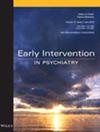A Longitudinal Study of Bidirectional Associations Between Sleep Disturbance and Internet Addiction Among Chinese Adolescents
Abstract
Purpose
Previous literature suggests that sleep disturbance is linked to Internet addiction, however, there was not sufficient empirical evidence to validate the causal relationships connecting these two variables. Our research intended to investigate these bidirectional associations in an adolescent population.
Methods
In all, 27 260 adolescents were assessed from December 17 to 26, 2021 and again 6 months later from May 17 to June 5, 2022. To evaluate Internet addiction, researchers employed the Revised Chinese Internet Addiction Scale (CIAS-R), while sleep disturbance was assessed through a four-item questionnaire addressing issues such as: difficulty initiating sleep, difficulty maintaining sleep, early morning awakening, and poor sleep quality.
Results
Sleep disturbance at baseline was linked to a higher probability of developing Internet addiction within 6 months, even after adjusting for relevant covariates. Similarly, individuals with Internet addiction at baseline exhibited a markedly increased risk of developing new-onset disturbance at the six-month follow-up.
Conclusion
This study highlights the bidirectional prospective links between sleep disturbance and Internet addiction among adolescents. The findings hold significant educational and clinical value, offering insights for managing Internet addiction alongside addressing sleep-related issues.

 求助内容:
求助内容: 应助结果提醒方式:
应助结果提醒方式:


